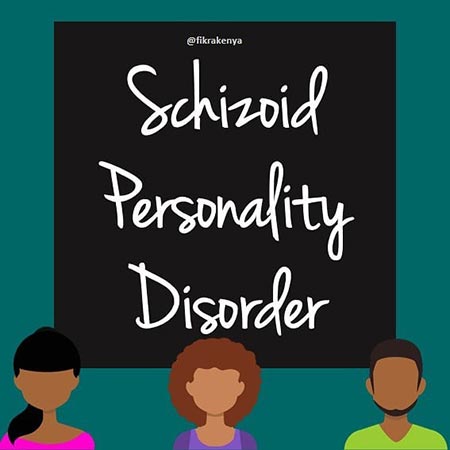What is Schizoid Personality Disorder?
Schizoid Personality Disorder is classified within ‘Cluster A’ Personality Disorders, referring to disorder that manifest with odd or eccentric behavior. Individuals with such personality disorder are often socially detached – a characteristic trait of Schizoid Personality Disorder.
Individuals with the disorder lack the desire to make social relationships, and may have trouble expressing emotions, often being perceived by others as distant or having a cold demeanour.
The disorder is reportedly slightly more prevalent in males than in females, and the onset may be around childhood or adolescence, presenting as poor relationships with peers or performing badly in school settings.
Correlates of the disorder remain unclear, though a considerable genetic component has been established. Other speculated associations are also made with childhood experiences and parenting styles.
The treatment of Schizoid Personality Disorder largely relies on psychotherapeutic modalities, and may involve role-play and group therapy in order to improve social skills. Pharmacotherapy may be involved in management paths when comorbidities are present.
Signs and Symptoms
The signs and symptoms of Schizoid Personality Disorder may include:
- Being detached from social relationships
- Indifferent or cold towards others
- Being emotionally inexpressive
- Persistently choosing solitary activities instead of interacting with others
- Lack of interest in any activities
- Coming off as “self-absorbed”
- Being unaffected by praise or criticism
- Reporting painful feelings, especially in the context of social interactions, in rare cases of opening up
- Difficulty expressing anger
- Lack of desire for sexual experiences
- Brief psychotic episodes in response to stress
Risk Factors
A slight male preponderance is reported in the prevalence of Schizoid Personality Disorder.
There is a paucity of aetiological data with respect to Schizoid Personality Disorder. Genetic correlates have been determined, linking the disorder to Schizophrenia as well as highlighting the genetic contribution of introversion that is significant in the symptomatology of Schizoid Personality Disorder. A strong heritability quotient is involved.
While there is a lack of concrete evidence highlighting environmental psychosocial factors involved in the presentation of Schizoid Personality Disorders, childhood factors such as institutionalization or isolation during childhood have been hypothesized to have an association with the disorder.
Parental modelling that encourages withdrawal from social interaction, indifference, and detachment have been considered as potential correlates to the development of the disorder.
Diagnosis of Schizoid Personality Disorder
It is important to consider the fact that individuals with Schizoid Personality Disorder rarely seek diagnosis or treatment of their own accord, owing to the nature of their personality traits. The process of diagnosing the disorder is based largely in thorough clinical assessments and relies on diagnostic criteria.
The patient’s clinical and social history must be taken and evaluated, and may also involve consulting with other individuals involved in their life. Assessment tools may be used in order to ascertain the presence of the disorder.
The DSM-5 highlights the following diagnostic criteria for the disorder:
A pervasive pattern of detachment from social relationships and a restricted range of expression of emotions in interpersonal settings, beginning by early adulthood and present in a variety of contexts, as indicated by four (or more) of the following:
- Neither desires nor enjoys close relationships, including being part of a family
- Almost always chooses solitary activities
- Has little, if any, interest in having sexual experiences with another person
- Takes pleasure in few, if any, activities
- Lacks close friends or confidants
- Appears indifferent to praise or criticism
- Shows emotional coldness, detachment, or flattened affectivity
The symptoms must not occur exclusively during the course of schizophrenia, a bipolar disorder or depressive disorder with psychotic features, another psychotic disorder, or autism spectrum disorder and must not be attributable to the physiological effects of another medical condition.
Treatment for Schizoid Personality Disorder
The treatment mode for Schizoid Personality Disorder typically takes the form of psychotherapy, and pharmacotherapy may more often target comorbid disorders. Management modalities for the disorder are not yet well-developed, and hence no concrete facets of treatment are accepted as a standard.
This is largely due to the limited number of individuals who approach mental health professionals for treatment, fuelled by their likelihood to isolate themselves and disagree with the need to receive professional help.
Therapeutic intervention for Schizotypal Personality Disorder may focus on the improvement of communication skills and work on educating the individual in order to develop appropriate social and interpersonal skills.
It may be difficult to get patients to want to seek out social involvement, but therapy and psychoeducation may help them learn to effectively relate to others and be more comfortable in social settings. This may be done through role-play, and group therapy can also have some efficacy if both the group and the patient are open to the endeavour.
Pharmacotherapy is considered as a treatment option for those individuals who have comorbid disorders that require treatment. Comorbidities for Schizoid Personality Disorder include major depressive disorder, other Cluster A personality disorders, and Avoidant Personality Disorder.
Differential Diagnosis
1. Other mental disorders with psychotic symptoms: Schizoid personality disorder can be distinguished from delusional disorder, schizophrenia, and a bipolar or depressive disorder with psychotic features because these disorders are all characterized by a period of persistent psychotic symptoms.
2. Autism spectrum disorder: There may be difficulty differentiating individuals with schizoid personality disorder from those with milder forms of autism spectrum disorder, which may be differentiated by more severely impaired social interaction and stereotyped behaviors and interests.
3. Personality changes due to another medical condition: Schizoid personality disorder must be distinguished from personality change due to another medical condition, in which the traits that emerge are due to the effects of another medical condition on the central nervous system.
4. Substance use disorders: Schizoid personality disorder must also be distinguished from symptoms that may develop in association with persistent substance use.
5. Other personality disorders and personality traits: Other personality disorders may be confused with schizoid personality disorder because they have certain features in common. These disorders are schizoid, schizotypal, and paranoid personality disorders, avoidant personality disorder and obsessive-compulsive personality disorder. It is, therefore, important to distinguish among these disorders based on differences in their characteristic features.
Specialist
It is rare for individuals with Schizoid Personality Disorder to approach professionals in order to receive a diagnosis.
However, mental health professionals such as psychiatrists or clinical psychologists may be approached in case of comorbid personality disorder, or if family members or other close individuals suggest a consult.
It may be difficult for general practitioners to accurately diagnose personality disorders due to their complex nature, and it is thus important for a professional with expertise in the field to be involved in the process.
In Conclusion
A Distinct personality is a culmination of your thoughts, feelings, and actions. It involves how you see yourself, and how you perceive, comprehend, and relate to the outside environment. During childhood, personality develops as a result of the interaction between inherited traits and environmental circumstances.
Children gradually develop the ability to recognize and appropriately respond to social cues as part of normal development. It is advisable to consult psychological experts who can start counseling at an early stage.
Book your session with us today





